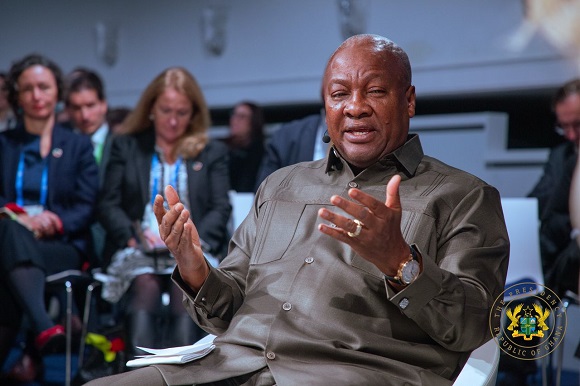President John Mahama on Friday reiterated the need for African countries to become self-reliant following the withdrawal of the United States Agency for International Development (USAID) funding support.
He said USAID’s withdrawal was adversity in opportunity, which must teach Africa to become more self-reliant.
Speaking at the Munich Security Conference (MSC) in Germany, President Mahama said prior to his departure for Munich, he issued a directive to the Minister of Finance to adjust in the budgets to take up the slack from the disruption in USAID funding.
This, he said amounted to $156 million for 2025, which was a bit above GH¢2 billion.
He said the USAID funding support to Ghana went into four critical areas of the economy, namely governance and democracy, healthcare, economic growth, and education.
He said the most critical was health because it went into maternities, PEPFAR
(US President’s Emergency Plan for AIDS Relief) activities, that includes HIV testing and provision of antiretrovirals and other support in the healthcare space, which mounts to the biggest chunk of it was about $78 million dollars.
He reiterated that the Government would make budget adjustments, saying, “Happily, when we have elections, we don’t present the budget until the new government takes over”.
“And so, we’re supposed to present the budget in March, so it’s possible for us to make provision to cover what the shortfall in US assistance is going to be.”
Speaking on the topic “Building or Burning Bridges: Economic and Development Cooperation Amid Multi-polarisation”, President Mahama urged African leaders to put measures in place to help the most vulnerable in their society.
He said the US played a critical role in the post-world order, and that post-world order had benefited the whole globe, including the US.
“The US has prospered from the post-world order. But it has gotten to a stage where it wants to recalibrate, and it has a right to recalibrate. But I believe that the recalibration should be in a less disruptive manner than it is happening now,” President Mahama stated.
“One of the things that the US is going to lose is that soft power that it has wielded in the world. I mean, these are grateful for the kind of assistance that they get. And so, for the US to decide that, no, we don’t want to have anything to do with it anymore, then they lose some of that soft power.”
President Mahama said there were many other partners, and that Africa would continue to collaborate with other countries.
“And that’s why we have a multipolar world. We are no longer a unipolar world. And so, as bridges are burning, new bridges are being formed, and we need to look for those new bridges and be able to link the world to those new bridges.”
President Mahama said the US was well admired in a lot of the developing world for the kind of assistance that it gives for its presence in many theaters.
“And so, if it decides that it’s withdrawing, I think that there are many other countries that can fill the gap,” he added.
He said aside from filling the gap, the USAID withdrawal sends a signal to Africa that the time had come for them to be more self-reliant when it comes to issues, to do especially with the vulnerable in our society.
“We should roll out more safety nets. We must go for more equitable societies, bridge the gap between the rich and the poor, and put out opportunities for our young people to be able to make a life for themselves,” he said.
He said self-reliance was not only at the national level, but on the continental level and there’s good news coming out of Africa; declaring that most countries had ratified the protocol on continental free trade in Africa and that trade was beginning to grow steadily.
“We’re able to export tariff-free into our countries. Of course, there are obstacles because our trade channels have been the colonial trade channels between us and Europe and not amongst ourselves.”
He said some of the things they need to deal with first was how they develop their infrastructure to be able to exchange goods amongst ourselves.
He said there was trade growing exponentially among African countries and that he believes that Africa had the human resources – young bright people who were willing to grab innovations, and they need the leadership to drive that energy to make their countries prosper.
“But I do believe, as a student of psychology that in all adversities there is opportunity and new orders bring out of disruptions,” President Mahama said.
“The disruption that is taking place now is going to yield a new order because we will have to adapt to what is happening.”
GNA





